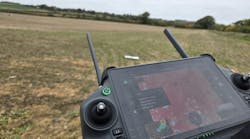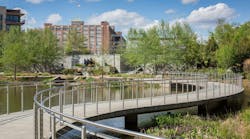New York awards $61 million for green stormwater resiliency projects
Governor Kathy Hochul has announced $61 million in Green Resiliency Grant (GRG) funding to advance eight stormwater infrastructure projects across New York State. Funded through the Clean Water, Clean Air, and Green Jobs Environmental Bond Act, the projects focus on using nature-based solutions to manage stormwater, reduce flooding, and strengthen climate resilience.
“Too many communities have experienced the devastation of severe flooding, and that’s why we’re investing in resiliency initiatives to protect vulnerable areas and make our state stronger and more resilient,” Governor Hochul said. “We’re investing where it matters — not just reacting to the next storm, but preparing for it — protecting families and businesses in the process.”
New York City will receive a total of $17.8 million for two major green infrastructure initiatives. The New York City Department of Environmental Protection was awarded $10 million for the North and South Conduit Median Green Infrastructure Project in Brooklyn and Queens, which will capture and treat stormwater to ease pressure on the city’s sewer system and improve water quality in Jamaica Bay. The New York City Housing Authority will receive $7.9 million to fund flood-mitigation measures at the Clinton Houses, designed to reduce localized flooding and protect infrastructure in Harlem.
The GRG program, launched in 2024 as part of Governor Hochul’s State of the State initiative, is administered through the New York State Environmental Facilities Corporation (EFC). The first round of grants awarded $60 million to projects across the state.
According to the Governor’s Office, this latest round of funding continues New York’s broader effort to invest in green infrastructure and modernize stormwater systems in the face of increasing extreme weather events.
Awarded funding:
- Buffalo Sewer Authority (Western NY) - $10 million to mitigate stormwater runoff with the installation of new bioretention and stormwater street trees. The project will help prevent combined sewer overflow events, improve water quality in Scajaquada Creek, and enhance resilience. New York State and the Buffalo Sewer Authority recently announced a historic commitment to significantly improve water quality in the Niagara River watershed, including the implementation of gray and green infrastructure projects at an estimated cost of $1 billion over a 15-year schedule, and this funding will help achieve those goals.
- Town of Brookhaven (Long Island) - $10 million for the Neighborhood Road Redevelopment Project, which will include bioretention, stormwater street trees, and underground stormwater storage systems. The improvements will help reduce flooding and protect water quality in Narrow Bay.
- City of Mount Vernon (Mid-Hudson) - $4.4 million for the Brush Park Green Infrastructure Project to install porous pavement, bioretention, and trees throughout a key recreation area. The project will help mitigate local flooding and enhance water quality in the Hutchinson River.
- New York City Housing Authority - $7.9 million for the Clinton Houses Cloudburst project to construct underground infiltration systems below basketball courts and parking lots. By capturing and filtering stormwater runoff on-site, the project will reduce flooding risks for residents, safeguard vital infrastructure, and lessen flows to New York City’s combined sewer system—ultimately improving water quality in the Harlem River.
- New York City Department of Environmental Protection - $10 million for the North and South Conduit Median Green Infrastructure Project in Brooklyn and Queens. The project will construct multiple bioretention areas to capture and treat stormwater, helping the City meet its 2030 goal of reducing combined sewer overflows and protecting the water quality of Jamaica Bay.
- City of Newburgh (Mid-Hudson) - $1.825 million for the Liberty Street Reconstruction Project, which will feature porous pavement, bioretention, and tree trenches. These upgrades will help the City meet its Long-Term Control Plan requirements by reducing combined sewer overflow and improving the health of the Hudson River.
- Village of Potsdam (North Country) - $8.975 million for stormwater detention and green infrastructure improvements, including the construction of multiple wet extended detention ponds. These measures will reduce flooding within the Village and improve the water quality of the Raquette River.
- Town of Rye (Mid-Hudson) - $8.1 million for the Rye Town Park Sustainability Project, which includes porous pavement, bioretention, rain barrels, stream daylighting, and drainage enhancements. These upgrades will help alleviate flooding and erosion while creating a safer, more sustainable park and beach along Long Island Sound.


